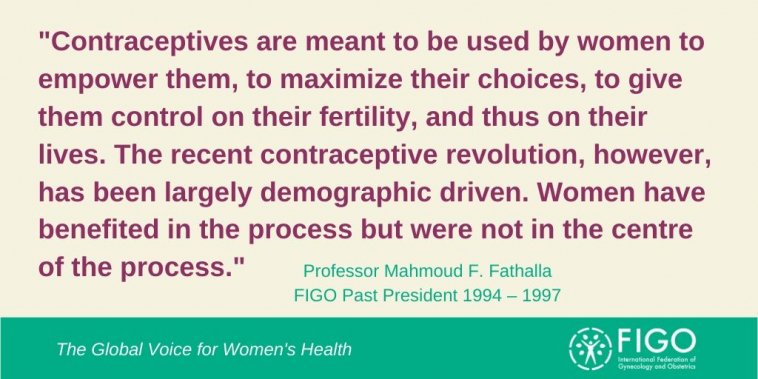Give women control of their fertility (1994)

Empowering women with the ability to regulate and control their fertility is a basic requirement for women's health, well-being and quality of life, and a basic requirement for the enjoyment of other social rights.
A woman who does not have the means or the power to regulate and control her fertility cannot be considered in a "state of complete physical, mental and social well-being", the definition of health in the constitution of the World Health Organization.
She cannot have the joy of a pregnancy that is wanted, avoid the distress of a pregnancy that is unwanted, plan her life, pursue her education, undertake a productive career, or plan her births to take place at optimal times for childbearing, ensuring more safety for herself and better chances for her child's survival and healthy growth and development.
Government views of female fertility are often translated into political interventions. According to the United Nations Policy Data Bank, in 1988 only 68 countries out of 170 had no government policies of interventions with respect to levels of fertility; 21 countries had government policies to increase fertility; 20 had policies to maintain fertility; and 61 had policies to decrease fertility. Government interventions to decrease or increase population growth vary.
Measures taken by governments to influence fertility behaviour, whether for an increase or decrease, can be classified into two broad categories: indirect and direct.
Indirect measures intended to lower fertility:
- Improving the status of women so that they can pursue a productive career, and not just a reproductive career.
- Enhancing child survival so that people will not need to over-reproduce in anticipation of expected child losses.
- Providing care and protection for the aged aims at making children less needed as a measure for old age security.
These indirect measures, apart from any intended effect on fertility, are good on their own, serving worthy social causes.
Social policies aimed at directly increasing or decreasing fertility fall in a wide spectrum, from the desirable to the acceptable to the objectionable:
-
Desirable
Provision of family planning services, including education and information, and maternity or paternity benefits and family allowances are desirable on their own.
-
Acceptable
Promotion of public awareness is acceptable, whether it is intended to decrease or increase fertility. It is, however, at the borderline. It can easily slip into the objectionable if it results in undue psychological pressure on the individuals.
-
Objectionable
In the category of the objectionable are incentives / disincentives / coercion to decrease fertility, and restriction of access to family planning / abortion to increase fertility. These strong handed measures by governments can impact adversely on the health of women, and are equally objectionable whether meant to decrease or increase a woman's fertility.
Both coerced sterilization or contraception and coerced motherhood deny women the dignity of making a choice in their reproductive life. The fundamental importance of choice is emphasised in the Cairo International Conference on Population and Development Programme of Action:
“The principle of informed free choice is essential to the long-term success of family-planning programs. Any form of coercion has no part to play… Governmental goals for family planning should be decided in terms of unmet needs for information and services. Demographic goals, while legitimately the subject of government development strategies, should not be imposed on family-planning providers in the form of targets or quotas for the recruitment of clients.”
Cairo International Conference on Population and Development (ICPD)
Contraceptives are meant to be used by women to empower them, to maximize their choices, to give them control on their fertility, and thus on their lives. The recent contraceptive revolution, however, has been largely demographic driven. Women have benefited in the process but were not in the centre of the process. As far as policymakers are concerned, women were often means to an end, objects and not subjects.
Some governments are short sighted not to see that when women are given a real choice, and the information and means to implement their choices, they will make the most rational decisions for themselves, for their communities and ultimately for the world at large.
This article outlines a presentation delivered by FIGO President (1994 – 1997) Mahmoud F. Fathalla in Washington DC, USA